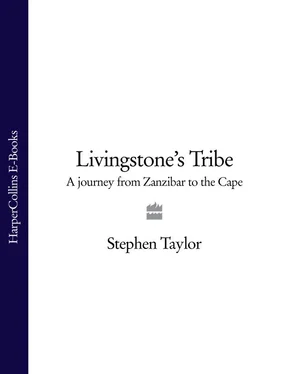Afterwards, a young man named Denis asked if I had found the old slave cells below my room. He guided me down steps descending from the courtyard of St Monica’s to a subterranean chamber. We had to duck low to enter, and once inside remained in a crouch. In the dark I could just make out a cavern about 30 feet long and 12 feet wide. On either side was a raised ledge on which slaves had lain, chained to the wall. The clearance between ledge and ceiling was less than 2 feet. I tried to clamber on to a ledge but was almost physically repulsed by claustrophobia.
Crouching and breathing heavily, I was struck by a thought obvious but compelling. The profligacy of the slavers was one of the puzzles of the ™ like the ships on which the slaves were transported, this chamber created conditions so atrocious that their mere survival was a wonder. But what if the suffering was not incidental, was instead intrinsic to a design intended to crush those it did not kill? The slavers’ reckless disregard for their merchandise made a perverse sense only if their ultimate concern was to extinguish the last flicker of the human spirit.
We are not used to coming across such crucibles of suffering intact. This death chamber of innumerable souls lies directly beneath the spot where I lie, under a mosquito net and a lazily turning fan.
‘WHAT YOU HAVE to remember about Zanzibar,’ said the Deputy Chief Justice, ‘is that it might be Africa, but it is not of Africa. Persian, Arab, Indian – even British to some extent – but it is not African.’
After just a few hours, I could see what he meant. That morning I had walked the mile or so to Dar es Salaam harbour, hefting the unfamiliar weight of the rucksack and already regretting bringing so many books. Dar was raw African metropolis, raucous, ramshackle. On seething streets lined by general stores offering cheap, gaudy trifles, traffic was reduced to a boiling gridlock. Sweating and floundering along, I nevertheless felt a momentary sense of liberation for having foresworn a taxi. Now, ferried less than thirty miles out into the Indian Ocean, I was brought to the Orient.
Zanzibar belonged in that realm of the traveller’s imagination occupied by phantasms, a destination from an opium dream. From a childhood stamp collection, that most potent of geographical stimulants, I recalled images of minarets and dhows, and bearded, turbaned potentates. To this world, the British were merely the last, and least tenacious, of the imperial powers to be carried on the trade winds.
The east coast was known to the geographers of Greece and Rome, most notably Ptolemy whose Geography referred to the region as Azania. Arab travellers called it Zenj, and were the first to explore it, al-Masudi in the tenth century, and the great ibn-Batuta on his voyage from Aden to Kilwa around 1330. The Shirazis brought the religion of Arabia and the culture of Persia. Reaching out across the Indian Ocean, they linked Africa with India, China and the Malay peninsula, trading slaves and ivory for glass and porcelain. The Portuguese came and went. Then, under the Omani sultans, Zanzibar entered its pomp.
No longer now did the traveller come to Zanzibar by dhow. These majestic and sinuous craft, the great jehazi of the Gulf trade and the cheeky little mashua plying the inshore waters, their lateens scything the sky like the crescent of Islam, were going the way of the transatlantic liner. Busy harbourside kiosks below the Lutheran church in Dar sold passage by motorised ferries which swept the visitor out to Zanzibar in hours.
At first sight the fabled shoreline was also disappointingly prosaic. Imagination prepared the visitor for a scent of cloves and ambergris coming off the sea, and a Sultan’s palace – bombarded by the British in 1896 in the briefest of all colonial conflicts – worthy of the name. The old Stone Town sat at the water’s edge, white and flat, just a few stubby minarets rising above the line of red-tile roofs. The harbour, once teeming with dhows, was deserted.
Feigning deafness to the imprecations of porters and hotel touts, I struck out towards the heart of the old quarter. Along Creek Road, lined with mango trees, the town sprang to life. At the market a crowd was gathered around a very large dead shark. Children gazed, transfixed, while men in skull caps negotiated noisily for cuts from the leviathan; even the flies seemed to abandon salted fish drying pungently in the sun for this new attraction.
Down in the Stone Town, alleys wandered among high lattice balconies. Along these narrow lanes, domestic and community life merged. Children tumbled from doors at the feet of a passer-by. Women gossiped from behind bright veils. Mysteries and intrigue seemed to lurk among the maze of lanes, although the reality was that in this intimate jumble no household could retain its secrets.
The Deputy Chief Justice’s house lay along one of the alleys. From Wolfgang Dourado’s door hung the emblem of Amnesty International, as though it were a crucifix to ward off evil. Dourado, indeed, was a Catholic of Goanese descent, but the cool, darkened living-room that lay beyond the door was furnished in the Arab manner.
‘So you’re an Aussie, eh?’ he said. Before I could correct him he went on, ‘in that case you’ll want a beer.’ He returned with an icy can. I gulped gratefully and in the hope of being offered another decided against correcting the misunderstanding.
He was a tiny bobbing figure with a high-pitched voice and a gleam in his eye, one of that breed of combative lawyers with their origins in the Indian subcontinent, who have devoted themselves in Britain’s ex-colonies to a good scrap and free speech with almost equal relish. For a member of the bench his pronouncements on his political masters were startlingly injudicious. ‘Nyerere? That bastard. Never liked him – utter hypocrite. Karume was another matter. A peasant and a madman, but with a humane side. I pray for his soul but I fear he’s sizzling like a kebab these days.’
Dourado had known both embrace and rejection by the British. On a legal scholarship in London, he learnt to love the collegiate rituals and stimulus, but was quickly reminded on his return that the same people who had invited him to their homes in London would not be seen with him socially in Zanzibar. ‘The thing about the Brits was that they had a good eye for the best sites. Where there was a good view, there you’d find the British club. Our clubs had to be tucked away. We found it baffling because in Goa, the Portuguese assimilated. One never knew what the Brits were afraid of – did they really think we might roger their wives?’ His eyes gleamed wickedly at this subversive thought.
‘More beer? Forgive me if I don’t join you, I’m getting over a bout of malaria.’
Other racial currents had drifted around the island. Under Omani Arab rule for centuries and a British protectorate for seventy years, Zanzibar was infiltrated in the last years of British control by mainlanders hungry for the island’s prosperity. In 1964, within months of independence, an Africanist revolution saw the eclipse of the Arabs. The Sultan fled and thousands of Arabs and Asians were massacred. Zanzibar was united politically with the mainland.
Nyerere’s attempts to graft socialism onto an island culture rooted in enterprise were doomed. Dourado, then attorney-general and one of nature’s Tories – ‘absolutely dyed in the wool, old chap’ – spoke out against the union and was first flogged, then detained. ‘Three months, fifteen days. Not very long, but vile conditions. After I came out I said I would rather have been detained in South Africa.’ He paused, then added with profound satisfaction: ‘That really got up Nyerere’s nose.’
For the time being, he was riding high again. ‘I’m writing my memoirs. I think I’ll call them From Cell to Bench .’ He crowed delightedly. ‘Boy, I’m a cocky bastard.’
Читать дальше












